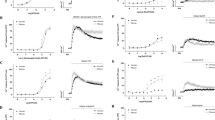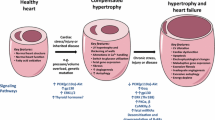Abstract
The mixed A1/A2a-adenosine agonist AMP579 given at reperfusion is protective in animal models of myocardial infarction. Receptor-blocking studies have indicated that the protection came from an adenosine receptor (AR), but neither A1- nor A2a-selective agonists could duplicate its protection. We recently found that A2b-selective agonists given at reperfusion are protective, and, therefore, tested whether AMP579 might also be an A2b agonist. We used human embryonic kidney cells overexpressing human A2b receptors as an assay system. In these cells, A2b receptor occupancy causes phosphorylation of ERK. AMP579 induced ERK phosphorylation with an EC50 of 250 nM and this phosphorylation could be blocked by MRS1754 or PSB1115, two highly selective blockers of human A2b receptors. We attempted to confirm our A2b hypothesis in a rabbit heart model of ischemia–reperfusion. AMP579 (500 nM) for 1 h starting at reperfusion reduced infarct size in isolated rabbit hearts exposed to 30 min of regional ischemia and 2 h of reperfusion (12.9 ± 2.2% infarction of risk zone vs. 32.0 ± 1.9% in untreated hearts). PSB1115 (500 nM) given for the first 15 min of reperfusion blocked AMP579’s protection (32.2 ± 3.1% infarction) which is consistent with an A2b mechanism. We conclude that AMP579 is a non-selective, but potent A2b-AR agonist, and that its protection against infarction is through that receptor.






Similar content being viewed by others
References
Baxter GF, Hale SL, Miki T, Kloner RA, Cohen MV, Downey JM, Yellon DM (2000) Adenosine A1 agonist at reperfusion trial (AART): results of a three-center, blinded, randomized, controlled experimental infarct study. Cardiovasc Drugs Ther 14:607–614
Budde JM, Velez DA, Zhao Z-Q, Clark KL, Morris CD, Muraki S, Guyton RA, Vinten-Johansen J (2000) Comparative study of AMP579 and adenosine in inhibition of neutrophil-mediated vascular and myocardial injury during 24 h of reperfusion. Cardiovasc Res 47:294–305
Cohen MV, Downey JM (2008) Adenosine: trigger and mediator of cardioprotection. Basic Res Cardiol 103:203–215
de Zwart M, Link R, von Frijtag Drabbe Künzel JK, Cristalli G, Jacobson KA, Townsend-Nicholson A, Ijzerman AP (1998) A functional screening of adenosine analogues at the adenosine A2B receptor: a search for potent agonists. Nucleosides Nucleotides 17:969–985
Eckle T, Krahn T, Grenz A, Köhler D, Mittelbronn M, Ledent C, Jacobson MA, Osswald H, Thompson LF, Unertl K, Eltzschig HK (2007) Cardioprotection by ecto-5’-nucleotidase (CD73) and A2B adenosine receptors. Circulation 115:1581–1590
Goto M, Liu Y, Yang X-M, Ardell JL, Cohen MV, Downey JM (1995) Role of bradykinin in protection of ischemic preconditioning in rabbit hearts. Circ Res 77:611–621
Goto M, Miura T, Iliodoromitis EK, O’Leary EL, Ishimoto R, Yellon DM, Iimura O (1991) Adenosine infusion during early reperfusion failed to limit myocardial infarct size in a collateral deficient species. Cardiovasc Res 25:943–949
Hausenloy DJ, Maddock HL, Baxter GF, Yellon DM (2002) Inhibiting mitochondrial permeability transition pore opening: a new paradigm for myocardial preconditioning? Cardiovasc Res 55:534–543
Hausenloy DJ, Tsang A, Mocanu MM, Yellon DM (2005) Ischemic preconditioning protects by activating prosurvival kinases at reperfusion. Am J Physiol 288:H971–H976
Hausenloy DJ, Yellon DM (2003) The mitochondrial permeability transition pore: its fundamental role in mediating cell death during ischaemia and reperfusion. J Mol Cell Cardiol 35:339–341
Hausenloy DJ, Yellon DM (2008) Clinical translation of cardioprotective strategies: report and recommendations of the Hatter Institute 5th International Workshop on Cardioprotection. Basic Res Cardiol 103:493–500
Kis A, Baxter GF, Yellon DM (2003) Limitation of myocardial reperfusion injury by AMP579, an adenosine A1/A2A receptor agonist: role of A2A receptor and Erk1/2. Cardiovasc Drugs Ther 17:415–425
Kopecky SL, Aviles RJ, Bell MR, Lobl JK, Tipping D, Frommell G, Ramsey K, Holland AE, Midei M, Jain A, Kellett M, Gibbons RJ (2003) A randomized, double-blinded, placebo-controlled, dose-ranging study measuring the effect of an adenosine agonist on infarct size reduction in patients undergoing primary percutaneous transluminal coronary angioplasty: The ADMIRE (AmP579 Delivery for Myocardial Infarction REduction) study. Am Heart J 146:146–152
Kuno A, Critz SD, Cui L, Solodushko V, Yang X-M, Krahn T, Albrecht B, Philipp S, Cohen MV, Downey JM (2007) Protein kinase C protects preconditioned rabbit hearts by increasing sensitivity of adenosine A2b-dependent signaling during early reperfusion. J Mol Cell Cardiol 43:262–271
Kuno A, Solenkova NV, Solodushko V, Dost T, Liu Y, Yang X-M, Cohen MV, Downey JM (2008) Infarct limitation by a protein kinase G activator at reperfusion in rabbit hearts is dependent on sensitizing the heart to A2b agonists by protein kinase C. Am J Physiol 295:H1288–H1295
Linden J, Thai T, Figler H, Jin X, Robeva AS (1999) Characterization of human A2B adenosine receptors: radioligand binding, western blotting, and coupling to Gq in human embryonic kidney 293 cells and HMC-1 mast cells. Mol Pharmacol 56:705–713
Liu GS, Richards SC, Olsson RA, Mullane K, Walsh RS, Downey JM (1994) Evidence that the adenosine A3 receptor may mediate the protection afforded by preconditioning in the isolated rabbit heart. Cardiovasc Res 28:1057–1061
Liu GS, Thornton J, Van Winkle DM, Stanley AWH, Olsson RA, Downey JM (1991) Protection against infarction afforded by preconditioning is mediated by A1 adenosine receptors in rabbit heart. Circulation 84:350–356
McVey MJ, Smits GJ, Cox BF, Kitzen JM, Clark KL, Perrone MH (1999) Cardiovascular pharmacology of the adenosine A1/A2-receptor agonist AMP 579: coronary hemodynamic and cardioprotective effects in the canine myocardium. J Cardiovasc Pharmacol 33:703–710
Morrison RR, Talukder MAH, Ledent C, Mustafa SJ (2002) Cardiac effects of adenosine in A2A receptor knockout hearts: uncovering A2B receptors. Am J Physiol 282:H437–H444
National Research Council (1996) Guide for the care and use of laboratory animals, 7th edn. National Academy Press, Washington, DC
Peakman M-C, Hill SJ (1994) Adenosine A2B-receptor-mediated cyclic AMP accumulation in primary rat astrocytes. Br J Pharmacol 111:191–198
Philipp S, Yang X-M, Cui L, Davis AM, Downey JM, Cohen MV (2006) Postconditioning protects rabbit hearts through a protein kinase C-adenosine A2b receptor cascade. Cardiovasc Res 70:308–314
Smits GJ, McVey M, Cox BF, Perrone MH, Clark KL (1998) Cardioprotective effects of the novel adenosine A1/A2 receptor agonist AMP 579 in a porcine model of myocardial infarction. J Pharmacol Exp Ther 286:611–618
Solenkova NV, Solodushko V, Cohen MV, Downey JM (2006) Endogenous adenosine protects preconditioned heart during early minutes of reperfusion by activating Akt. Am J Physiol 290:H441–H449
Thornton JD, Liu GS, Olsson RA, Downey JM (1992) Intravenous pretreatment with A1-selective adenosine analogues protects the heart against infarction. Circulation 85:659–665
Vander Heide RS, Reimer KA (1996) Effect of adenosine therapy at reperfusion on myocardial infarct size in dogs. Cardiovasc Res 31:711–718
Xu Z, Downey JM, Cohen MV (2001) AMP 579 reduces contracture and limits infarction in rabbit heart by activating adenosine A2 receptors. J Cardiovasc Pharmacol 38:474–481
Xu Z, Downey JM, Cohen MV (2003) Timing and duration of administration are crucial for antiinfarct effect of AMP 579 infused at reperfusion in rabbit heart. Heart Dis 5:368–371
Xu Z, Yang X-M, Cohen MV, Neumann T, Heusch G, Downey JM (2000) Limitation of infarct size in rabbit hearts by the novel adenosine receptor agonist AMP 579 administered at reperfusion. J Mol Cell Cardiol 32:2339–2347
Yang X-M, Krieg T, Cui L, Downey JM, Cohen MV (2004) NECA and bradykinin at reperfusion reduce infarction in rabbit hearts by signaling through PI3 K, ERK, and NO. J Mol Cell Cardiol 36:411–421
Acknowledgments
This work was supported by grant HL-20468 from the Heart, Lung, and Blood Institute of the National Institutes of Health.
Author information
Authors and Affiliations
Corresponding author
Additional information
Y. Liu and X. Yang contributed equally to this manuscript.
Rights and permissions
About this article
Cite this article
Liu, Y., Yang, X., Yang, XM. et al. AMP579 is revealed to be a potent A2b-adenosine receptor agonist in human 293 cells and rabbit hearts. Basic Res Cardiol 105, 129–137 (2010). https://doi.org/10.1007/s00395-009-0056-9
Received:
Revised:
Accepted:
Published:
Issue Date:
DOI: https://doi.org/10.1007/s00395-009-0056-9




